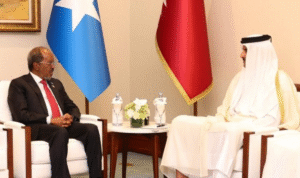Mogadishu, Somalia (AQRI.net) – In recent years, the Boycott, Divestment, Sanctions (BDS) movement, which urges various forms of boycott against Israel, has gained significant momentum across the Middle East. Here in Somalia, many are witnessing and discussing the ramifications of this movement, as it sees an increasing influence on both political and everyday life.
The BDS movement, initiated in 2005 by Palestinian civil society groups, has been a focal point of discussion across the Arab world, from the bustling markets of Cairo to the diplomatic corridors in Doha. Its core aim is to apply international pressure on Israel to comply with international law and Palestinian rights. Many in the region regard it as a peaceful and effective method of protest against Israeli policies.
In Somalia, which historically has had no formal ties with Israel, the movement is more than just a political statement; it is seen as a symbolic gesture of solidarity with the Palestinian cause. Community leaders and activists here point out that the BDS movement aligns with the broader public sentiment of frustration over the ongoing conflict in the Palestinian territories.
As the movement’s influence spreads, discussions among Somali intellectuals and political analysts are intensifying. They are examining the potential implications of embracing the boycott more fully and considering the economic and diplomatic effects it may have on Somalia’s relations with Western and Middle Eastern countries.
Activists across Mogadishu have organized discussions and forums to educate the public about the BDS movement, highlighting its goals and impacts. “It’s about standing up for human rights and justice in a non-violent manner,” one activist explained at a recent gathering. “We have to show solidarity and let the world know that Somalia supports Palestine.”
However, not everyone is aligned with the movement. Critics argue that such actions could limit Somalia’s burgeoning economic relationships and diplomatic engagements across the globe. There is a concern that supporting BDS unequivocally might put Somalia at odds with nations that maintain strong ties with Israel.
Despite these challenges, support for the movement remains strong among the general populace. Many Somalis express a shared sense of historical struggle and empathy for the plight of Palestinians, recognizing parallels between their own experiences and those of the Palestinians.
As the BDS movement gains traction, the pressing question remains: What will be the long-term impact on Somalia and the broader Middle East? While it is unclear what the future holds, the current discourse highlights the complex intersection of geopolitics, societal values, and historical narratives. The road ahead is likely to be as nuanced and varied as the conversations happening today in Somalia’s capital and beyond.







Comment